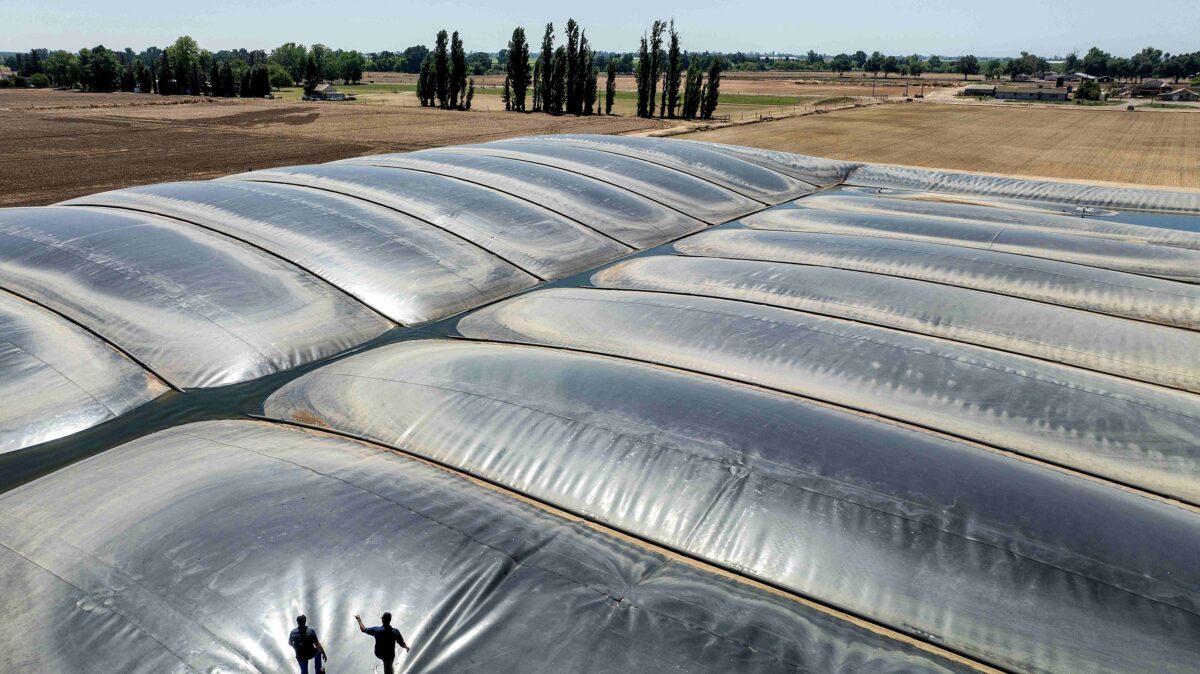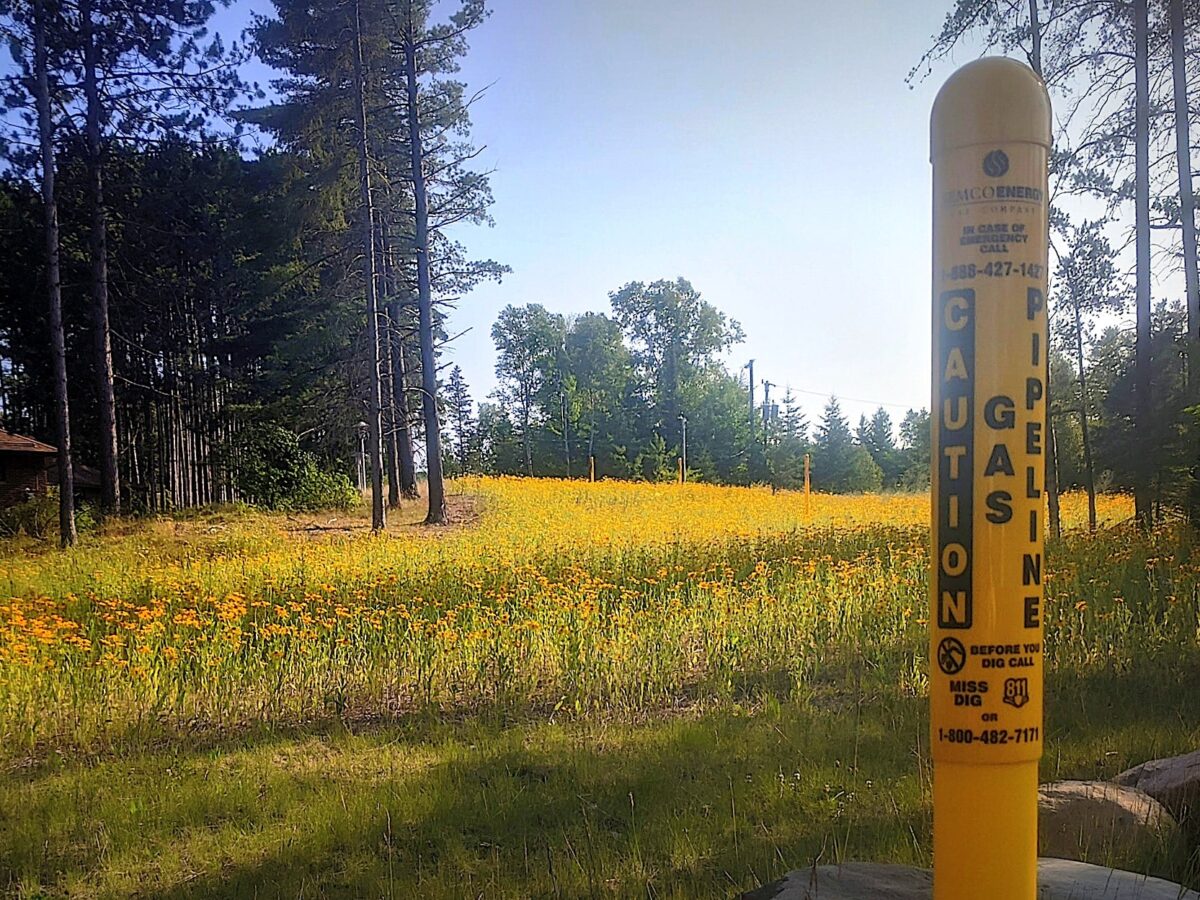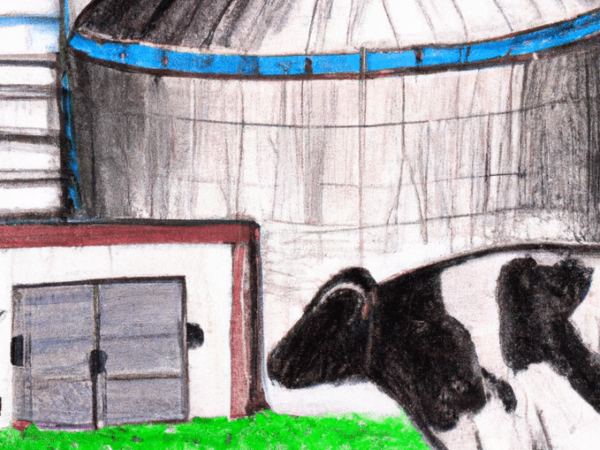Overview:
-Two Michigan House bills would regulate digestate as solid waste rather than liquid.
-Reclassifying digestate and its highly mobile nutrients and contaminants in this manner could threaten well water supplies and drive harmful algal blooms, environmental groups say.
-"Treating hazardous waste as a solid product and relying on a set of voluntary standards that don't actually exist for this cocktail of ingredients is a true recipe for disaster," says Michigan Environmental Council's Megan Tinsley.
On Thursday, environmental groups spoke out against a pair of bills in Lansing that would reduce regulations for digestate, a byproduct of the biogas industry, arguing the changes would lead to toxic substances and high levels of nutrients polluting the state’s groundwater.
Biodigesters slowly cook manure, slaughterhouse waste, food scraps, and other materials to produce methane for energy, creating digestate in the process, which is used as fertilizer. More than 130 digesters are operating in Michigan, according to the American Biogas Council, an industry trade group.
Michigan House Bills 4257 and 4265 could assist the buildout of digesters in the state by reducing state oversight of biodigesters and digester waste, regulating digestate as solid waste rather than liquid. Reclassifying digestate and its highly mobile nutrients and contaminants in this manner could threaten well water supplies and drive harmful algal blooms, environmental groups say.
“This is a recipe for creating a rapidly escalating public health and tourism disaster for the state of Michigan,” Christy McGillvray, legislative and political director for the Sierra Club Michigan Chapter, told Michigan’s House Agriculture Committee on Thursday.
The bills are sponsored by Reps. Jerry Neyer (R-Shepherd) and Joey Andrews (D-St. Joseph). Most of the bills’ cosponsors are Republicans, although they have bipartisan support.
Industry representatives say current regulations mean the state is missing out on jobs and investment.
“Over $14 billion in capital is sitting on the sidelines right now because of these issues, and our industry has the ability to add 30,000 jobs to the state,” Heather Dziedzic, vice president of policy for the American Biogas Council, told the agriculture committee May 8.
Food waste and animal manure could be used to create “renewable natural gas to power or heat over a million homes,” and digestate is valuable fertilizer, she said.
Michigan’s 2023 climate law lists biogas as a renewable energy source. Biogas production can capture some of the methane from the storage of manure and other wastes. Environmental advocates have drawn attention to methane leaks from biodigesters and the potential for digester credits and tax breaks to incentivize large livestock farms, which are a major source of greenhouse gas emissions.
Digester waste sparks resident, regulator concerns
Reports from those living near the troubled Fremont Digester in west Michigan, which is scheduled to shut down this year, show residents are extremely concerned about digestate from the facility.
In a 2024 statement from For Love of Water and other environmental groups, Kathy Morrison, a farmer living near the Fremont digester, said the smells of digestate were nothing like odors from a nearby turkey concentrated animal feeding operation, or CAFO, or manure applications.
“I could only liken it to having my head in a full port-a-potty,” she said.
Digestate has been found to contain toxic PFAS chemicals and heavy metals, Tracy Keckskemeti, assistant director of the Michigan Department of Environment, Great Lakes, and Energy’s Materials Management Division, told the House committee May 8. Testing has shown the material can also contain E. coli and other harmful bacteria, although anaerobic digestion may break down some of these pathogens.
Concentrated nitrates and phosphorus in digestate could also make water pollution worse, Traverse City-based publication Circle of Blue reports. Increases in phosphorus cause harmful algal blooms like the one that shut down Toledo’s drinking water supply for three days in 2014.
An April memorandum from the Environmental Law and Policy Center said changing how digestate is classified would “further endanger Michigan’s already-threatened water resources.”
“The CAFO and slaughterhouse waste streams defined in these Bills, however, are not ‘solid’ in any meaningful sense of the word and nothing about the anaerobic digestion process changes that,” the memo states, adding the waste streams travel through soil and reach ground and surface water more easily than solid waste.
EGLE officials emphasized on May 8 that digestate is wastewater and Sydney Hart, legislative liaison for EGLE, said the agency cannot support the bills as drafted.
MORE REPORTING FROM PLANET DETROIT
Michigan ‘clean fuel’ legislation draws heat from environmental groups
Advocates say bill encourages polluting biofuels, while helping the fossil fuel industry. But some say legislation is needed to ramp up EVs.
Dismay as Michigan hands out millions of dollars in ‘low carbon’ grants for gas projects
Two-thirds of the money went to support expansion of natural gas and biogas infrastructure.
Study finds biogas is no silver bullet in Michigan’s climate woes
A state regulator said the fuel might still show promise in ‘hardest-to-decarbonize’ industrial applications. A recent industry report on the viability of developing biogas as an emissions-reducing energy source in Michigan highlights the controversial fuel’s limits. However, the state may still invest taxpayer resources in developing it. The report found that, in the best-case scenario,…
Protecting water a ‘national security issue’
Changing digestate regulations could be especially problematic in the absence of other pollution controls and may violate state and federal law, according to environmental advocates.
Deregulating digestate would mean managing it with the Generally Accepted Agricultural Management Practices, or GAAMPS, Megan Tinsley, water policy director for the Michigan Environmental Council, said at the Thursday hearing. These guidelines are intended to protect farms from nuisance complaints, but don’t address digestate, she said.
“Michigan has over 1.2 million private household drinking water wells. Treating hazardous waste as a solid product and relying on a set of voluntary standards that don’t actually even exist for this cocktail of ingredients is a true recipe for disaster,” Tinsley said.
Changes to digestate regulation could also violate existing laws, environmental groups warn. The ELPC memo says the bills violate several state and federal laws governing pollution as well as the Michigan Constitution’s requirement that the Legislature protect the state’s water and other natural resources.
Changes to digestate rules would also take place in a context where other protections are lacking, according to state Rep. Carrie Rheingans (D-Ann Arbor).
At the May 8 hearing, she said Michigan still lacks strong polluter pay laws to address contamination or a statewide septic code to protect water resources.
“There’s no backstop there for these wells that are all over our state,” she said, adding that Michigan is unique in having so much fresh water.
“It’s a national security issue. If we’re starting to run out of water, Michigan is where we’re going to get our water.”





